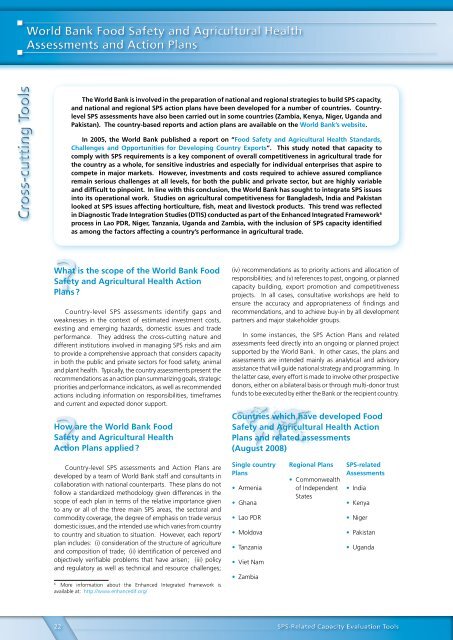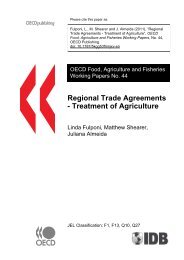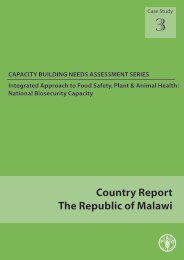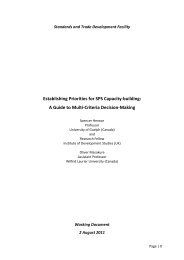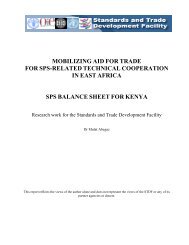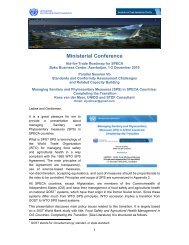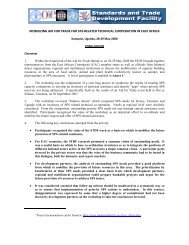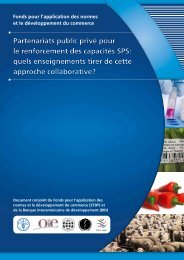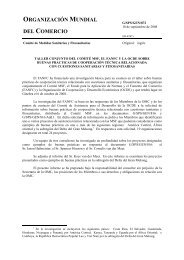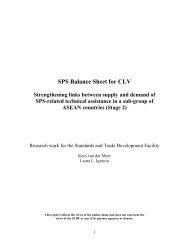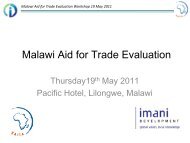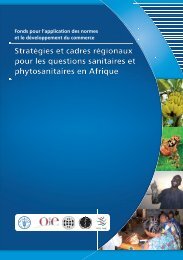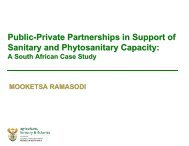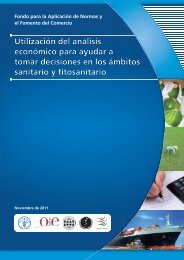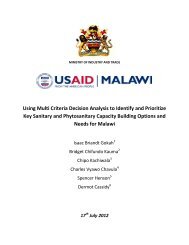SPS-Related Capacity Evaluation Tools - Standards and Trade ...
SPS-Related Capacity Evaluation Tools - Standards and Trade ...
SPS-Related Capacity Evaluation Tools - Standards and Trade ...
You also want an ePaper? Increase the reach of your titles
YUMPU automatically turns print PDFs into web optimized ePapers that Google loves.
Cross-cutting <strong>Tools</strong><br />
World Bank Food Safety <strong>and</strong> Agricultural Health<br />
Assessments <strong>and</strong> Action Plans<br />
? What is the scope of the World Bank Food<br />
Safety <strong>and</strong> Agricultural Health Action<br />
Plans ?<br />
?<br />
The World Bank is involved in the preparation of national <strong>and</strong> regional strategies to build <strong>SPS</strong> capacity,<br />
<strong>and</strong> national <strong>and</strong> regional <strong>SPS</strong> action plans have been developed for a number of countries. Countrylevel<br />
<strong>SPS</strong> assessments have also been carried out in some countries (Zambia, Kenya, Niger, Ug<strong>and</strong>a <strong>and</strong><br />
Pakistan). The country-based reports <strong>and</strong> action plans are available on the World Bank’s website.<br />
In 2005, the World Bank published a report on “Food Safety <strong>and</strong> Agricultural Health <strong>St<strong>and</strong>ards</strong>,<br />
Challenges <strong>and</strong> Opportunities for Developing Country Exports”. This study noted that capacity to<br />
comply with <strong>SPS</strong> requirements is a key component of overall competitiveness in agricultural trade for<br />
the country as a whole, for sensitive industries <strong>and</strong> especially for individual enterprises that aspire to<br />
compete in major markets. However, investments <strong>and</strong> costs required to achieve assured compliance<br />
remain serious challenges at all levels, for both the public <strong>and</strong> private sector, but are highly variable<br />
<strong>and</strong> difficult to pinpoint. In line with this conclusion, the World Bank has sought to integrate <strong>SPS</strong> issues<br />
into its operational work. Studies on agricultural competitiveness for Bangladesh, India <strong>and</strong> Pakistan<br />
looked at <strong>SPS</strong> issues affecting horticulture, fish, meat <strong>and</strong> livestock products. This trend was reflected<br />
in Diagnostic <strong>Trade</strong> Integration Studies (DTIS) conducted as part of the Enhanced Integrated Framework 6<br />
process in Lao PDR, Niger, Tanzania, Ug<strong>and</strong>a <strong>and</strong> Zambia, with the inclusion of <strong>SPS</strong> capacity identified<br />
as among the factors affecting a country’s performance in agricultural trade.<br />
Country-level <strong>SPS</strong> assessments identify gaps <strong>and</strong><br />
weaknesses in the context of estimated investment costs,<br />
existing <strong>and</strong> emerging hazards, domestic issues <strong>and</strong> trade<br />
performance. They address the cross-cutting nature <strong>and</strong><br />
different institutions involved in managing <strong>SPS</strong> risks <strong>and</strong> aim<br />
to provide a comprehensive approach that considers capacity<br />
in both the public <strong>and</strong> private sectors for food safety, animal<br />
<strong>and</strong> plant health. Typically, the country assessments present the<br />
recommendations as an action plan summarizing goals, strategic<br />
priorities <strong>and</strong> performance indicators, as well as recommended<br />
actions including information on responsibilities, timeframes<br />
<strong>and</strong> current <strong>and</strong> expected donor support.<br />
How are the World Bank Food<br />
Safety <strong>and</strong> Agricultural Health<br />
Action Plans applied ?<br />
Country-level <strong>SPS</strong> assessments <strong>and</strong> Action Plans are<br />
developed by a team of World Bank staff <strong>and</strong> consultants in<br />
collaboration with national counterparts. These plans do not<br />
follow a st<strong>and</strong>ardized methodology given differences in the<br />
scope of each plan in terms of the relative importance given<br />
to any or all of the three main <strong>SPS</strong> areas, the sectoral <strong>and</strong><br />
commodity coverage, the degree of emphasis on trade versus<br />
domestic issues, <strong>and</strong> the intended use which varies from country<br />
to country <strong>and</strong> situation to situation. However, each report/<br />
plan includes: (i) consideration of the structure of agriculture<br />
<strong>and</strong> composition of trade; (ii) identification of perceived <strong>and</strong><br />
objectively verifiable problems that have arisen; (iii) policy<br />
<strong>and</strong> regulatory as well as technical <strong>and</strong> resource challenges;<br />
6 More information about the Enhanced Integrated Framework is<br />
available at: http://www.enhancedif.org/<br />
(iv) recommendations as to priority actions <strong>and</strong> allocation of<br />
responsibilities; <strong>and</strong> (v) references to past, ongoing, or planned<br />
capacity building, export promotion <strong>and</strong> competitiveness<br />
projects. In all cases, consultative workshops are held to<br />
ensure the accuracy <strong>and</strong> appropriateness of findings <strong>and</strong><br />
recommendations, <strong>and</strong> to achieve buy-in by all development<br />
partners <strong>and</strong> major stakeholder groups.<br />
In some instances, the <strong>SPS</strong> Action Plans <strong>and</strong> related<br />
assessments feed directly into an ongoing or planned project<br />
supported by the World Bank. In other cases, the plans <strong>and</strong><br />
assessments are intended mainly as analytical <strong>and</strong> advisory<br />
assistance that will guide national strategy <strong>and</strong> programming. In<br />
the latter case, every effort is made to involve other prospective<br />
donors, either on a bilateral basis or through multi-donor trust<br />
funds to be executed by either the Bank or the recipient country.<br />
Countries which have developed Food<br />
Safety <strong>and</strong> Agricultural Health Action<br />
Plans <strong>and</strong> related assessments<br />
(August 2008)<br />
Single country<br />
Plans<br />
• Armenia<br />
• Ghana<br />
• Lao PDR<br />
• Moldova<br />
• Tanzania<br />
• Viet Nam<br />
• Zambia<br />
Regional Plans<br />
• Commonwealth<br />
of Independent<br />
States<br />
<strong>SPS</strong>-related<br />
Assessments<br />
• India<br />
• Kenya<br />
• Niger<br />
• Pakistan<br />
• Ug<strong>and</strong>a<br />
22 <strong>SPS</strong>-<strong>Related</strong> <strong>Capacity</strong> <strong>Evaluation</strong> <strong>Tools</strong>


